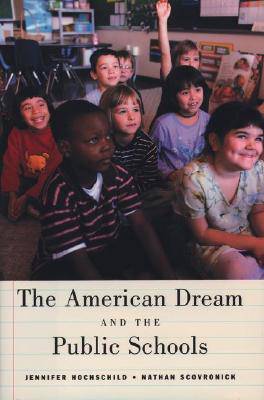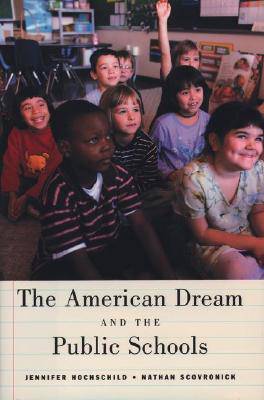
- Afhalen na 1 uur in een winkel met voorraad
- Gratis thuislevering in België vanaf € 30
- Ruim aanbod met 7 miljoen producten
- Afhalen na 1 uur in een winkel met voorraad
- Gratis thuislevering in België vanaf € 30
- Ruim aanbod met 7 miljoen producten
Zoeken
The American Dream and the Public Schools
Jennifer L Hochschild, Nathan Scovronick
Hardcover | Engels
€ 44,95
+ 89 punten
Uitvoering
Omschrijving
Why is education policy so contentious? Do conflicts over specific issues in schooling have anything in common? Are there general principles that can help us resolve these disputes? In this book the authors find the source of many debates over schooling in the multiple goals and internal contradictions of the national ideology we call the American dream. They also propose a framework for helping Americans get past acrimonious debates in order to help all children learn.
The American Dream and the Public Schools examines issues that have excited and divided Americans for years, including desegregation, school funding, testing, vouchers, bilingual education, multicultural education, and ability grouping. These seem to be separate problems, but much of the contention over them comes down to the same thing--an apparent conflict, rooted in the American dream, between policies designed to promote each student's ability to pursue success and those designed to insure the good of all students or the nation as a whole. The authors show how policies to promote individual success too often benefit only those already privileged by race or class, and too often conflict, unnecessarily, with policies that are intended to benefit everyone. The book also examines issues such as creationism and Afrocentrism, where the disputes lie between those who attack the validity of the American dream and those who believe that such a challenge has no place in the public
schools. At the end of the book, the authors examine the impact of our nation's rapid racial and ethnic transformation on the pursuit of all of these goals, and they propose ways to make public education work better to help all children succeed and become the citizens we need.
The American Dream and the Public Schools examines issues that have excited and divided Americans for years, including desegregation, school funding, testing, vouchers, bilingual education, multicultural education, and ability grouping. These seem to be separate problems, but much of the contention over them comes down to the same thing--an apparent conflict, rooted in the American dream, between policies designed to promote each student's ability to pursue success and those designed to insure the good of all students or the nation as a whole. The authors show how policies to promote individual success too often benefit only those already privileged by race or class, and too often conflict, unnecessarily, with policies that are intended to benefit everyone. The book also examines issues such as creationism and Afrocentrism, where the disputes lie between those who attack the validity of the American dream and those who believe that such a challenge has no place in the public
schools. At the end of the book, the authors examine the impact of our nation's rapid racial and ethnic transformation on the pursuit of all of these goals, and they propose ways to make public education work better to help all children succeed and become the citizens we need.
Specificaties
Betrokkenen
- Auteur(s):
- Uitgeverij:
Inhoud
- Aantal bladzijden:
- 320
- Taal:
- Engels
Eigenschappen
- Productcode (EAN):
- 9780195152784
- Verschijningsdatum:
- 6/03/2003
- Uitvoering:
- Hardcover
- Formaat:
- Genaaid
- Afmetingen:
- 234 mm x 163 mm
- Gewicht:
- 623 g

Alleen bij Standaard Boekhandel
+ 89 punten op je klantenkaart van Standaard Boekhandel
Beoordelingen
We publiceren alleen reviews die voldoen aan de voorwaarden voor reviews. Bekijk onze voorwaarden voor reviews.











